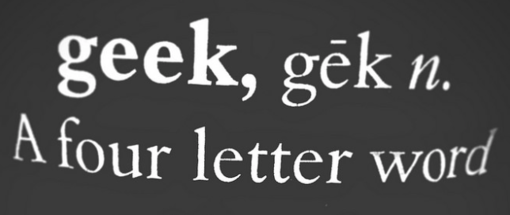ARTICLE TEXT
There was controversy about it, but the Inuit famously and really do have at least 50 words for snow. The Scots have 241!
The Sami people of northern Scandinavia and Russia use more than 1000 words for reindeer.
Sanskrit, the language of the Kama Sutra, offers 267 words for love.
Languages tend to evolve to reflect the cultural and practical priorities of the societies that speak them.
This linguistic truism came to mind recently when, as part of research for one of my cartoons, I turned to Google Translate in search of a French translation for the English word “geek.” There wasn’t one. Nor in Spanish. All the Romance languages came up short; Google suggested “disadattato” in Italian, but that’s different — it means “misfit,” or “a person who is poorly adapted to a situation or environment.”
A “geek” — “a person often of an intellectual bent who is disliked,” according to Merriam-Webster — is decidedly distinct from a misfit.
You can tell a lot about a culture from its language. I had stumbled across a revealing peculiarity about American English: we insult people for being intelligent.
That’s not true about most of the rest of the world.
At least among Western cultures and compared to many others, we Americans enjoy the dubious distinction of having a high degree of linguistic diversity it comes to mocking the smart and the educated (who, I can attest as the expellee-cum-graduate of an Ivy League school, are not always the same).
Bookworm. Brain. Brainiac. Dork. Dweeb. Egghead. Freak. Grind. Grub. Longhair. Nerd. Poindexter. Pointy-headed. Smarty-pants. Techie.
Esoterically, doubledome.
You have to journey far away from the areas dominated by the Indo-European language group in order to find direct equivalents of words like “nerd.” On the other hand, languages like French are extremely rich in insults for stupid people: “bête comme ses pieds,” or “dumb as hell,” literally means “as stupid as his/her feet.” Apparently this derives from the fact that feet are the body part furthest away from your brain. More zoologically, “blaireau” (badger) refers to an idiot.
When you think about it — which, being American, we rarely do — it should come as little surprise to realize that few insults string the French more effectively than being called stupid. France, after all, is a country with a 385-year-old parliamentary body composed of academics and other notables who rule on the usages, vocabulary and grammar of the national language, the Academie Française, and where one of the most popular television programs in history featured intellectual authors smoking like chimneys as they ruminated over the cultural and political controversies of the day, “Apostrophes.” After food and wine, the French worship the life of the mind.
The United States, on the other hand, elected Donald “Celebrity Apprentice” Trump over Hillary “I Have a 12-Point Plan” Clinton.
Bush over Gore.
Ike over Adlai. Twice.
As CUNY Professor Deborah M. De Simone notes in her essay discussing Richard Hofstadter’s classic Pulitzer-winning book Anti-intellectualism in American Life, the 2000 Democratic nominee’s IQ proved divisive: “Al Gore was both mocked and applauded for the depth and manner of his oratory while George W. Bush was both ridiculed and embraced for his unsophisticated vocabulary.” A reporter assigned to cover Gore’s campaign complained about getting stuck with “the government nerd.”
Bush wasn’t really stupid. The point is that he pretended to be, and rather convincingly. After losing an election in Texas, young Dubya had sworn, Scarlett O’Hara-like, never to get out-countrified again. Bush won reelection in 2004, in part because voters infamously told pollsters they’d rather drink a beer with him than with the more intellectual “French-looking” John Kerry.” (Talk about dumb! Bush was a teetotaler.)
Trump won the beer poll question during the 2016 presidential campaign. Like Bush, he doesn’t drink.
Europeans make fun of dumb people.
Americans elect them to high office.
Despite the rise of Silicon Valley and its technoelites, the Revenge of the Nerds in the South Bay has managed to line stock portfolios without moving the needle on America’s cultural values. Jocks still rule high schools that spend millions on new football stadiums while starving the arts. Faced with foreign policy crises, even “liberal” Congressmen reflexively endorse bombing over diplomacy in order to look “tough.” Scientific geniuses like the late Stephen Hawking are framed as cultural curiosities to marvel over rather than heroes to be emulated as are football players, rappers and movie stars (specifically buff men who act in action movies).
One can reasonably argue over which country, the United States or France, is superior in various respects. But how, as we transition to an information-based economy, can we doubt that elevating intelligence as a sociocultural ideal is, well, smarter than elevating buffoons?
Maybe it’s time to take a cue from our proudly pro-intelligence and pro-education cultural cousins across the Atlantic. Point at President Trump and other public figures whenever they say anything that sounds less than intelligent, and laugh at them. Not only for being racist, rude or insensitive — but just for being stupid.
Dumber even than their feet.
Americans are so ignorant they even think they’re the only ignorant people in the world.
They are among the best at it, you have to admit
Chinese have similar words for “nerd”: “书呆子”, literally translated to “book doofus”. However, It is not used nearly as common as “geek” and “nerd” in English.
It also has a much thinner scope. It only refers to people who are too dogmatic about theoretical knowledge, yet lacks real world skills.
Same thing in (some variants of) Spanish. You have ñoño, someone who is always trying to outperform the others academically, usually it’s those who make a huge effort without seeing proportional results for it.
But we have very few insults for intellectual or smart people. Practically none I can think of.
“Friki” was popular when I was a teen, but that comes from the English, “freak”. And obviously we use nerd and geek sometimes.
Arguably, though, friki is more about the media and entertainment the person consumes than about them being smart.
it’s interesting you narrow the definition like that, because i think that’s really the original definition of nerd… like if you asked someone in the 50’s in the US, that’s what they would have described… someone who takes theory to anti-social extremes… but like you said, it seems to cover a lot more now, or at least get used a lot more…
and i love how literal “book dufus” is, that’s great
I enjoy the fact that the phrase used to make fun of “smart people” uses extremely simple words.
That’s really just Chinese in general. Terms are made as though a 7 year old kid tried to describe it. Here’s some examples:
- computer: electric mind
- hospital: health park
- teacher: old wiseman
- refrigerator: cold box
- phone: electric talk
- plane: flying machine
I think the way you translate Chinese characters into English loses level of sophistication of the characters. For example, “医院” is definitely more sophisticate than “health park”, despite character has these meanings.
“书呆子” really is as simple as it can get.
Also common items typically have more approachable names.
For example, “医院” is definitely more sophisticate than “health park”
such as the real characters being 醫院. you could spend a while dissecting (pun not intended) all of the characters that make up “medicine” and its rich etymology
yes! it seems to expose its origins among the common folk pretty clearly, doesn’t it…
It only refers to people who are too dogmatic about theoretical knowledge, yet lacks real world skills.
Should definitely make an English word for exactly that.
Then I know what to call that fucker who keeps asking retarded questions at the end of a meeting where everyone else is in agreement.
oh no, a lot of the time, “book dufus” actually need to be well-versed in theoretical knowledge, I doubt “people asking stupid question at the end of the meeting” fit that description.
I’m talking about the people who get caught up on little details and hypotheticals which are irrelevant, just asking “what if” for the sake of it and wasting everyone’s time
deleted by creator
Should definitely make an English word for exactly that.
We have! Teacher.
The article is written on the assumption that Google Translate is as good a reference as any when it comes to insults - which is very bold. Western culture is not so disparate and there are words for “geek” in French, mainly “intello” and which infact short for “intellectual”.
“Geek” was not translated, not because it has no translation, but because it is now commonly used in the French language, and I’d bet the reason is similar for other languages.
Anyway, well written article but based on a stupid assumption.
Yeah, I agree this is all based on a false premise. I also agree it’s well written but a turd sculpted into the shape of a rose is still just a turd.
It’s a specious article and that’s a dangerous thing in a world where false information spreads so fast.
These kinds of insults definitely exist here in the UK too, e.g., swot, spod, as well as geek, neek, nerd, etc. I don’t think these are imported from the US, as they’ve been around for a long time. Perhaps a manifestation of anglo-saxon anti-intellectualism?
US here. Never heard of swot, spod, or neek. So i definitely don’t think those are imports from here.
Uk here, not heard of those terms either.
I have definitely heard neek, not the other two. Regional perhaps?
Swot is a venerable and frequently used word, derived from the word sweat. Neek is what’s current with my children’s generation (South London): it’s a portmanteau of nerd and geek, apparently. Spod may well be regionally and temporally specific, as it’s what I used to be called in SW England in the 1980s.
deleted by creator
This is much more of a political commentary than a discussion of linguistics–is there any actual evidence of this language difference?
I’m not disagreeing with the political argument. I’d just like to know more about the title’s claim that these words are rare in other languages/cultures/countries.
The central claim would be more persuasive if the evidence weren’t just “I typed it into google translate”. That is a very limited way to see what words a language has
I agree. The claim is certainly interesting if true, but putting a few words in Google translate is hardly evidence.
The best you’re going to get is anecdotal evidence at most.
I think universally, arrogance is very much frowned upon, and a lot of intelligent (and not so intelligent) people use their self-perceived intelligence to put others down. So you’re going to find a lot of words for arrogant, pedantic or annoying people. But insults for just smart or academically talented people are indeed rare outside of English. At least in my experience.
Of interest, in Canada’s 2011 federal election the Conservative party with Stephen Harper won by painting Michael Ignatieff as a book nerd professor from Harvard University.
They ran ads with taglines such as “Just visiting,” “Just in it for himself,” and, most notoriously, “He Didn’t Come Back For You.” These all suggested he was an erudite professor from the USA who wanted to run Canada for his own self-aggrandizement and mocked his intelligence and academic bona fides.
That’s pretty clever, actually. Props to them for the smart campaign.
I just found a few by just searching duckduckgo for equivalent words in other languages to geek and nerd instead of trying direct translations (especially since geek and nerd are commonly used in other languages already). There was also a reddit post where folks from other countries shared their smart-person insults.
I’m insulted how little effort the author put into supporting his thesis.
“Streber” in German is a common insult if you’re good in school, and it often meant social death in class. Sure, geek and nerd have become commonplace and are used as German words now, but that’s also because if you are one your English is good enough and it’s just easier to use the short word from another language that pretty much all geeks and nerds use than to use the German one.
It has actually not really the negative connotation that the English word has, it feels more like a name for a subculture, like goth.
Geek and nerd are now like that too, in the last ten to fifteen years. They used to be insults, now it’s a subculture.
Geek and nerd had negative connotations when geeks and nerds were commonly poor, but then things shifted and, notably with the rise of the Information Age, being a geek and/or nerd turned into being useful in becoming wealthy. Now it is a compliment.
True of all insults, really. Same reason, for example, words with associations to slavery are considered insults. Or those related to the sale of sexual favours. The implication is that one is poor. Any words you can throw at someone who is rich will be something most people will want to wear as a badge of honour.
Schlaumeier
There was controversy about it, but the Inuit famously and really do have at least 50 words for snow.
Well, already lost me here. Inuit have at least 50 words TO DESCRIBE snow. Like cold, powdery, white. English has probably just as many. The Inuit don’t have 50 different words to say “snow”.
I think they count it because their language compounds the adjective together with the noun, so “powdery snow” is one word, “icy snow” is another, “wet snow” is yet another, etc. At least, that’s what I’ve read in past discussions where this has come up. I don’t speak Inuit. Hell, as an American, statistically on average I speak less than one language.
I’m not Inuit, but living in a snowy Canada area made me understand the different types of snow. We didn’t have peoper words for the distinct types but Inuit would because it is highly important when traveling on it or seeking refuge in it.
And, if I recall, they use compound words, similar to German.
Thanks for the book report on it, Poindexter
lol where’s the nearest trash can… we’ll show this nerd…
Screw that! I say we give 'em a swirly!
awww, swirlies… those were the days…
Awful waffle! Awful waffle!
This is not true at all, anti-intellectualism is common across the world.
As common? Of course that would be hard to quantify. Trying to, by examining language use is an interesting idea, though.
Geeks, nerds, etc took ownership of those words years ago and call themselves by them. While insulting by definition, they’re no longer used or understood that way by anyone I’ve interacted with.
Source: am geek, also nerd.
I was on a call with a bunch of engineers from IBM a couple of weeks ago. I was teaching them how to demonstrate our product (I don’t work for IBM.) After about a week on calls we were chatting and one of the guys told me that he was in the process of building a highly accurate replica of the cockpit of the F16. After a pause of about 5 seconds I said, “You fucking nerd!” which caused everyone on the call including him to burst into laughter.
I embrace every word that the dumpth try to use to slight me. Intellectual? Yes. Progressive? Yes. Woke? Yes. Bring them on. I’m all of those things and I’m proud that I am.
I still call anyone who is infatuated with a topic of interest a nerd, but usually tongue in cheek because the likelihood is I’m also interested
Geeks, nerds, etc took ownership of those words years ago and call themselves by them. While insulting by definition, they’re no longer used or understood that way by anyone I’ve interacted with.
Yep. Am both now, and was both back when the terms were pejorative.
It’s a good natured insult, but still an insult. Just because a group uses a word to describe it’s self doesn’t suddenly absolve the negativity associated with that word.
What is insulting about geek and nerd?
Is it the biting a chicken’s head off thing? I’m not really sure how that translates to an insult, though. Maybe you are ashamed of biting chicken heads? But if that’s the case, stop biting chicken heads?
It’s lost its association with chickens decades ago. Not even the recipients of the insult are generally aware of its origins.
Fair, but it has also lost its connotations with being an insult over the decades.
Being a geek and/or nerd became economically useful when we moved into the information age, and thus is now considered in high regard. The average Joe is now envious of geeks and nerds. Most people would love to be able to trade places with Bill Gates or Elon Musk.
Of course, it wasn’t always that way.
Would have been a much more coherent article if it just discussed pervasive anti-intellectualism (it was so weird seeing Republicans start to throw out intellectual elite as a perjorative) without trying to draw tentative, at best, contrasts with other countries.
elite
https://en.wikipedia.org/wiki/Populism
Almost any us vs them division works for this if you can sell the idea. Even completely fictional ones.
There is a French word for geek : “Tronche”. You would use that word like this : " ce que tu fais c’est vraiment tronche"eaning what you are doing is very geek.
Never used it as adjective ! but as a noun. It’s definitely depreciative. Not always, but often.
We have many insults for geeks in the Netherlands, the word Geek, ‘Gek’ or ‘Geck’ comes from our regions…Nederduits
“Secchione, quattr’occhi, sfigato” the “nicest” in Italian. Smart people are bullied everywhere not only us, probably more in some countries than in us, seeing how popular is the silicon valley.
allumé/allumée in french
I really wish Canadian culture didn’t follow America’s on this point.


















